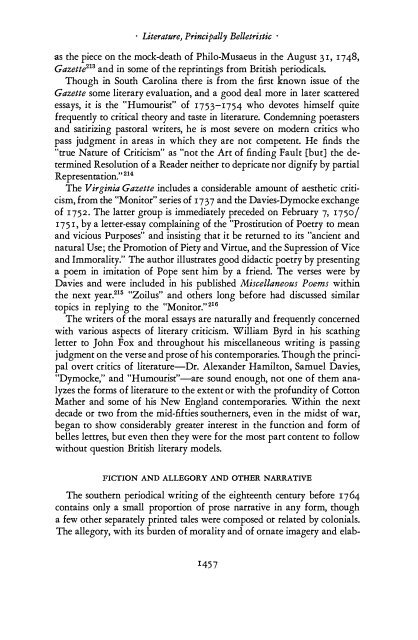Literature, Principally Belletristic - University of Tennessee, Knoxville
Literature, Principally Belletristic - University of Tennessee, Knoxville
Literature, Principally Belletristic - University of Tennessee, Knoxville
Create successful ePaper yourself
Turn your PDF publications into a flip-book with our unique Google optimized e-Paper software.
· <strong>Literature</strong>,<br />
<strong>Principally</strong> <strong>Belletristic</strong> .<br />
as the piece on the mock-death <strong>of</strong> Philo-Musaeus in the August 31, 1748,<br />
Gazette213 and in some <strong>of</strong> the reprintings from British periodicals.<br />
Though in South Carolina there is from the first known issue <strong>of</strong> the<br />
Gazette some literary evaluation, and a good deal more in later scattered<br />
essays, it is the "Humourist" <strong>of</strong> 1753-1754 who devotes himself quite<br />
frequently to critical theory and taste in literature. Condemning poetasters<br />
and satirizing pastoral writers, he is most severe on modern critics who<br />
pass judgment in areas in which they are not competent. He finds the<br />
"true Nature <strong>of</strong> Criticism" as "not the Art <strong>of</strong> finding Fault [but] the determined<br />
Resolution <strong>of</strong> a Reader neither to depricate nor dignify by partial<br />
Representation." 21 4<br />
The Virginia Gazette includes a considerable amount <strong>of</strong> aesthetic criticism,<br />
from the "Monitor" series <strong>of</strong> 1737 and the Davies-Dymocke exchange<br />
<strong>of</strong> 1752. The latter group is immediately preceded on February 7, 1750/<br />
175 I, by a letter-essay complaining <strong>of</strong> the "Prostitution <strong>of</strong> Poetry to mean<br />
and vicious Purposes" and insisting that it be returned to its "ancient and<br />
natural Use; the Promotion <strong>of</strong> Piety and Virtue, and the Supression <strong>of</strong> Vice<br />
and Immorality." The author illustrates good didactic poetry by presenting<br />
a poem in imitation <strong>of</strong> Pope sent him by a friend. The verses were by<br />
Davies and were included in his published Miscellaneous Poems within<br />
the next year.215 "Zoilus" and others long before had discussed similar<br />
topics in replying to the "Monitor." 216<br />
The writers <strong>of</strong> the moral essays are naturally and frequently concerned<br />
with various aspects <strong>of</strong> literary criticism. William Byrd in his scathing<br />
letter to John Fox and throughout his miscellaneous writing is passing<br />
judgment on the verse and prose <strong>of</strong> his contemporaries. Though the principal<br />
overt critics <strong>of</strong> literature--Dr. Alexander Hamilton, Samuel Davies,<br />
"Dymocke," and "Humourist"-are sound enough, not one <strong>of</strong> them analyzes<br />
the forms <strong>of</strong> literature to the extent or with the pr<strong>of</strong>undity <strong>of</strong> Cotton<br />
Mather and some <strong>of</strong> his New England contemporaries. Within the next<br />
decade or two from the mid-fifties southerners, even in the midst <strong>of</strong> war,<br />
began to show considerably greater interest in the function and form <strong>of</strong><br />
belles lettres, but even then they were for the most part content to follow<br />
without question British literary models.<br />
PICfION AND ALLEGORY AND OTHER NARRATIVE<br />
The southern periodical writing <strong>of</strong> the eighteenth century before 1764<br />
contains only a small proportion <strong>of</strong> prose narrative in any form, though<br />
a few other separately printed tales were composed or related by colonials.<br />
The allegory, with its burden <strong>of</strong> morality and <strong>of</strong> ornate imagery and elab-<br />
1457















